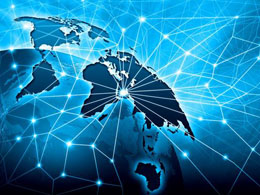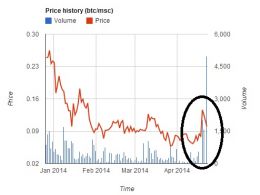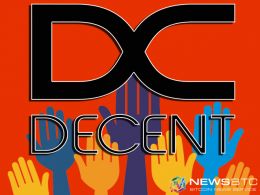
MaidSafe Prepares for Safecoin Crowd-Sale to Facilitate "Decentralized Internet"
INSIDE BITCOINS - MaidSafe (http://maidsafe.net/), creators of blockchain-like technologies that can decentralize nearly every aspect of the Internet, including all Web services, today announced the completion of their white paper and the April 22 opening of a 30-day crowd-sale of its enabling software, Project SAFE, taking place at www.safecoin.io.
David Irvine, MaidSafe founder and CEO, and Nick Lambert, MaidSafe COO and co-founder of Project SAFE, will present their innovation during the Inside Bitcoins conference at the Jacob K. Javits Convention Center on Tuesday, April 8, at 4:15 pm.
Project SAFE (Secure Access For Everyone) is a fully distributed platform that rides on top of TCP/IP, using key value storage and Kademlia-based routing to decentralize every aspect of the Internet, including all Web Services. The creation of "safecoins" will eliminate the need for middlemen in all network transactions, from online storage to social networks to website hosting and trading mechanisms. What Bitcoin is doing for decentralizing money, safecoin will do for decentralizing all Internet services, including enterprise data centers.
During the crowd-sale, 10 percent of all safecoins will be made available to buyers from anywhere in the world (429,496,729) through a proxy token, the MaidSafeCoin. Once the MaidSafe network goes live, the MaidSafeCoins will be redeemable for the network's native safecoins at a 1-to-1 ratio.
The Internet's infrastructure is increasingly unable to deal with the demands of over 2.4 billion users -- a number expected to grow by more than another 1 billion by 2017. The current system of connected servers storing and acting as gatekeepers to information is woefully inadequate and expensive, with data centers using up to 1.5 percent of the entire world's electricity.
By decentralizing the Internet, SAFE (Secure Access For Everyone) will enable:
- Private, secure communications, with autonomous handling of structured and unstructured data types.
- Decentralized solutions that replace HTTP, SMTP, FTP, etc., and are immune to DNS manipulation, (i.e., this network cannot be blocked)
- Ability for people to self-authenticate onto the network and join anonymously
- A network that requires no administrators nor human intervention of any kind
- A highly usable and free API that enables a plethora of developers to create the next wave of secure applications not possible with today's centralized architecture
- An underlying cryptocurrency (safecoin) that will incentivize all actors in the ecosystem
"At the root of it all, we want to put people back in control of their data -- not Google, Facebook or other large corporations," said Lambert. "Why put up with Google ads you don't want and why ask DropBox permission to access your own files? It's about liberty and freedom. This is the Internet sans frontieres!"
SAFE will operate on an incentivized proof-of-resource model. Once a computer becomes part of the network, its ability to store data chunks (CPU speed, bandwidth, online time, etc.) will be measured and the computer's account will be issued the corresponding amount of safecoins. This software may also be traded or purchased.
This project is quite simply the beginning of a new Internet, one that everyone will own and nobody will control. For more information, please consult the MaidSafe white paper: https://github.com/maidsafe/Whitepapers/blob/master/Project-Safe.md
About MaidSafe
Founded in February, 2006, with the intent to decentralize the Internet, MaidSafe has been working on Project SAFE for eight years (longer than the Bitcoin blockchain has been in existence). Based in Troon, Scotland, the 14-person team has received a total of $5 million in private investment to date, and it will be using the not-for-profit MaidSafe Foundation (http://www.maidsafefoundation.org/) to control issuance and manage the funds generated during the April 2014 crowd-sale.
The MaidSafe platform is designed for third-party application providers to create their own application environment and removes developer risk for startups. Self-authentication allows for everyone to be in complete control of all data, beyond encryption to include physical access. In essence, nobody knows where any data is located, thereby providing completely private and unilateral access by individuals. The network lets users manage any information completely free of any third-party involvement. Users can store, share, chat and publish 100 percent under their own control and knowledge.
For more information about MaidSafe, visit http://maidsafe.net/
Related News





